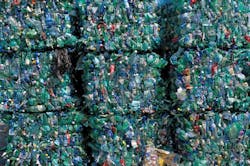From the November 2022 issue of Plastics Recycling.
By Ron Shinn
Virgin resin manufacturers are announcing big investments in recycling and grabbing headlines that make it appear they are fixing the problem of hard-to-recycle plastics.
Consumer pressure has reached the point that chemical companies know that, to keep selling resin, they need to include some material with recycled content.
But what does additional recycling capacity — which will mostly come from a chemical recycling process — mean for hundreds of traditional mechanical plastics processors?
“I think there is a good place in our industry for chemical recycling on some of these very hard-to-process items,” said Scott Saunders, general manager of the KW Plastics Recycling Division in Troy, Ala. “But the problem is this: When they make these announcements, you never can pin them down on a feedstock stream.
“If you build a facility to recycle hard-to-recycle items, somebody has to collect that material and get it prepared in a way you can process it. You end up seeing big announcements, and you find out later that all they are going to do is compete with the mechanical recyclers for streams that are already existing.”
Saunders said he expects to see a fight for flows of raw materials as the new systems come online. He said he believes whoever has the best economic model over time will win.
Virgin resin manufacturers might also try to convert some of their wide-spec resin to postconsumer resin (PCR). “There is a huge market for wide-spec material. It has always been sold as virgin material but not to a specific grade, and it has an established market,” Saunders said. “What is going to prevent them from taking those pellets, putting them through the recycling plant, then claiming it is PCR and putting a big markup on it to sell it as certified PCR?”
Mechanical recyclers might see a more competitive market for raw materials, but Saunders said his company, which recycles an estimated 500 million pounds a year of HDPE and PP, will be able to compete.
“Mechanical recycling is the most efficient method for rigid plastics such as regrind, purgings, containers or parts,” he said. “If all you are going to do is take a molecule that is already being recycled and recycle it in a different fashion, what have you accomplished?”
While it might be a good business model for the resin companies, it negates the environmental statements they are making, Saunders said.
Will the new capacity result in more plastics being recycled?
“I hope so,” Saunders said. The two largest trash-collection companies, Waste Management Inc. and Republic Services, have announced investments designed to improve collection and processing. Meanwhile, KW Plastics is building a new processing line that will add 100 million pounds of recycling capacity a year when it comes online in early 2023.
“That is a direct result of these announcements,” Saunders said. “We don’t know exactly how much material that will bring to the market, but we want to be ahead of the curve. When it comes available, we are ready to take it.”
Saunders, who serves on the board of the Association of Plastic Recyclers, said KW Plastics remains bullish on mechanical recycling. “Consumers have become more concerned, and that is really what it is going to take for the recycling rate to move up,” he said.
Plastic recycling is a tough business, and, if Saunders is correct, it is going to get even tougher for legacy recyclers.
Ron Shinn, editor
About the Author
Ron Shinn
Editor
Editor Ron Shinn is a co-founder of Plastics Machinery & Manufacturing and has been covering the plastics industry for more than 35 years. He leads the editorial team, directs coverage and sets the editorial calendar. He also writes features, including the Talking Points column and On the Factory Floor, and covers recycling and sustainability for PMM and Plastics Recycling.
